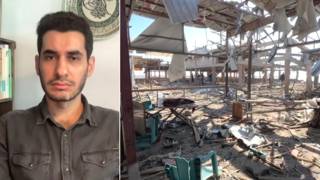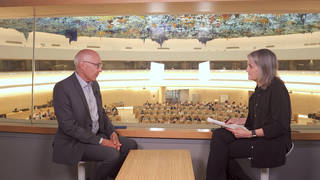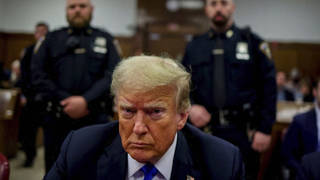
Guests
- Lawrence Hammchair of the People’s Organization for Progress.
- Danny Gloveractor, film director and political activist.
In New Jersey, lawmakers have recently introduced legislation that would require the state’s attorney general to review every death at the hands of law enforcement. One of the key backers of the New Jersey legislation has been Larry Hamm, chair of the People’s Organization for Progress in New Jersey. We recently spoke to Hamm and actor Danny Glover in Philadelphia at the Democratic National Convention.
Transcript
JUAN GONZÁLEZ: We end today’s show looking at police brutality. In New Jersey, lawmakers have recently introduced legislation that would require the state’s attorney general to review every death at the hands of law enforcement. One of the key backers of the New Jersey legislation has been Larry Hamm, chair of the People’s Organization for Progress in New Jersey.
AMY GOODMAN: We recently spoke to Larry Hamm and actor Danny Glover in Philadelphia at the Democratic National Convention, interviewing them the morning after the mothers of children killed by police or vigilantes spoke at the DNC. I began by asking Larry Hamm to talk about the significance of that rare moment at the convention.
LARRY HAMM: Well, it was very painful. But let me say, first of all, that it was an extraordinary moment. I’ve been involved in electoral politics going back to the National Black Political Convention in 1972, and I couldn’t have imagined a moment when a major political party would have the mothers of victims like these premiered and presented at a national convention. So it was an extraordinary moment. And the mothers presented themselves well. And they spoke well. And there’s nothing that the mothers said that I could disagree with. I love those mothers.
But at the same time, I wish someone would have said police brutality must stop. Nobody said that, I mean, unless I missed it. Police brutality must stop. In the two years since the death of Michael Brown, 2,500 people have been killed by police in the United States—last year, 1,135 killed; this year, 506 killed. And it goes on and on and on. No one said—and you had the mothers—the mothers who actually spoke, two of the three, their sons were victims of racist violence, not police brutality, per se. But no one said racist violence must stop. Nobody talked about the numbers of incidents. And I wouldn’t expect them to do so, but you have to understand, there was a whole segment of the convention that kind of dealt with this issue. They brought the chief of police from Pittsburgh to speak. And the emphasis was on community-police cooperation, gun control. But nobody’s talking about police brutality.
I support the Black Lives Matter movement. But we’re saying black lives matter, black lives matter. No one is saying stop police brutality. Our people are being killed in the street. And the people who are killing them are not being held accountable, not being indicted, not going to trial, not being found guilty. And this is the problem. You know, we don’t want police—I’m not—one of these chiefs talked about, “Well, they expect so much of the police, to be this, that.” Not expecting that. What we expect: Don’t kill unarmed black people. And if you do it, you have to face the same consequences as if I would have done it. And this is the problem. And it was a very painful moment for me when the mothers spoke, but they did well. I have no criticisms of those women in pain.
But in New Jersey, we have Abdul Kamal, who was killed by the Irvington police, shot 15 times. He had a cellphone in his hand. Jerame Reid got out the car with his hands up—it’s on video—shot at point-blank range by a black police officer, Braheme Days. Kashad Ashford, shot four times in the head while he was unconscious. Little 14-year-old Radazz Hearns, shot seven times in the back. You know, and it goes on and on. And somehow, the discussion is always deflected, and these—the murders of those police in Dallas and, I believe it was, in Baton Rouge, you know, every time the movement seems to get white-hot and there’s a real sharp focus on the police, something is used to deflect and to fuzzy that focus. And we got to get that focus back. We got to get it back, and we got to force every possible change that is needed to deal with this problem.
AMY GOODMAN: Well, Larry, you have been pushing for this for decades. I don’t know if a week goes by where Democracy Now! doesn’t get a press release from People’s Organization for Progress in Newark, New Jersey, where you are holding another protest somewhere in New Jersey—
LARRY HAMM: Yes.
AMY GOODMAN: —around a person who has been killed or someone you’re remembering or demanding some kind of change.
LARRY HAMM: Right.
AMY GOODMAN: What is that change that you feel is so critical to really make a difference in this country to deal with police violence?
LARRY HAMM: Well, right now, with the cases that we’re dealing with in Jersey, the four I just mentioned, we want the U.S. attorney for New Jersey, Paul Fishman, to launch civil rights investigations into the deaths of Kamal, Reid, Ashford, and the shooting of Hearns. In all of those cases, there were no indictments—nobody indicted, nobody going to trial. And we want civil rights investigations. Not that we’re saying that that in itself is a panacea, but one of the reforms we need in New Jersey, we need an office of the special prosecutor just to—independent office of special prosecutor just to investigate these police shootings.
And Bernie Sanders had something in his platform. He said that every time the police kill someone, there should be a special independent investigation. But there is a whole agenda of reforms that are needed. But what we need at this moment is to hold together this critical mass that seems to have come together at this moment to bring about fundamental change.
JUAN GONZÁLEZ: Well, you know, one of the things I’m wondering—maybe Danny might want to comment on this—is this is not a new story. In fact, if you go back to the Chicago race riot of 1919, the East St. Louis riot in 1917, the Detroit riot of 1942, Newark in ’67—
LARRY HAMM: Yes.
JUAN GONZÁLEZ: —Detroit, almost always mass insurrections in the black community have resulted from police violence. And I’ve come to the conclusion, I think—I don’t know if you agree—that every 20 years, police departments of America change personnel, because most of the cops are in for 20, 25 years, and they retire. And there’s no institutional memory or legacy, so you have a new generation of cops that are on the street right now that weren’t there in 1992 during Rodney King, who weren’t there in 1960, and the institutions themselves don’t train and make that a part of their training of the police to how they are supposed to respect the black and brown communities of the country. So you have to go through these—through these spates of tides of sudden killings, and then resistance by the communities, before the new generation of cops recognizes you can’t be doing that, people are going to resist you.
DANNY GLOVER: Thank you, Larry, for all of the work that you’ve done over the years. We go way back and know each other for some times. And certainly, I want to talk about, certainly, the video itself, which just so moved me. And as I sat here—because I wasn’t there last night in the convention center, as I sat here and watched it before we—and listened to the words and all that stuff, I just thought about what a great moment, what a moment, what a signature moment and a key important moment. We must remember this moment, that moment, not the election after, but for decades to come. Remember this moment, because maybe within that, there’s a context of the situation where we can—we can create some kind of different narrative about this, our relationship.
And it goes back, our relationship with law enforcement. It goes back since before the Civil War. It goes back to the slave militias. It goes back. It goes way back to after the Civil War, the relationship with law enforcement and everything. So let’s—we could go on and on and on. But it’s the culture of it. It’s the culture within the department, which seems to perpetuate itself and sustain itself, in some sense.
Now, certainly, when I thought about—when they talked about the movement, I was thinking about, well, when we talk about Black Lives Matter and those courageous women who began that and then built that—
LARRY HAMM: Absolutely.
DANNY GLOVER: —they’ve talked about police brutality. It’s right up on that.
LARRY HAMM: Yes, yes.
DANNY GLOVER: Right up on the agenda. But they’ve been inclusive of other dynamics. When you talk about Black Lives Matter, you have to talk about education. You have to talk about all the different things that affect black lives, the lives of young black children, all the time, every single thing.
I remember when I worked for city government in the Model Cities Program, the office of community development, in 1971, for six-and-a-half years. We knew, in the Hunters Point, in the Bayview-Hunters Point, a predominantly black community, we knew how many jobs were going to be coming there this summer, summer jobs and everything else. I’m not saying the model wasn’t perfect, but there was a different kind of engagement. All of us who came through and witnessed what happened with the Black Panther Party, when they talked about community, community and police protection and all those things. But they added other things to the program—free breakfast for children, free education, free healthcare. All those become a part of what Black Lives Matter. In a larger context, in a larger time, it’s a caring about our whole being, who we are spiritually, who we are physically, etc.
AMY GOODMAN: I want to intone these three mothers’ names. We’re talking about Geneva Reed-Veal, who was the mother of Sandra Bland, Sandra Bland who was taken by a police officer in Texas, who was taken to jail—she couldn’t afford the bond. She is—she’s taken to jail because she was pulled over, supposedly for not signaling a traffic lane change.
LARRY HAMM: Right.
AMY GOODMAN: Then you had Lucia McBath, mother of Jordan Davis, young teenager who was in a car with his friends, Thanksgiving, in a parking lot, playing music. And a white man drove up, annoyed by their loud music, instead of just pulling his car away, he ends of opening fire on them and killing Jordan. And then, finally, Lesley McSpadden, who was the mother of Michael Brown, who was killed by a police officer two years ago. At the Democratic National Convention, all standing, and also Eric Garner’s mother was standing there.
DANNY GLOVER: Yes, yes, exactly.
AMY GOODMAN: Does this—Danny Glover, what does this mean for you in terms of who you will vote for? Did this surprise you, as you heard that this took place? You have long been a surrogate for Bernie Sanders, as Larry Hamm was a supporter of Bernie Sanders. Larry, I think you’re going to go in maybe a different direction than Danny Glover is going to go in casting a final vote. Who are you going to vote for? Do you know at this point, Danny Glover?
DANNY GLOVER: I’m going to be very frank: When I go to the polls, I’m going to vote for Hillary Clinton. I’m going to be very frank about that. I think that the idea of Donald Trump as president, see, is also a frightening idea. But I know at the same time, in voting for Hillary Clinton, I want to put the kind of pressure on her. I want to make her live up to that platform and everything else. I want us to exceed what has been put in that platform. I want us to see a movement come out of this.
Now, in the event that she wins, we’re going to fight, still. In the event that she doesn’t win, we’re going to fight, still. There’s no worse coming, in the event she doesn’t. But, I mean, I’m going to go—I know where black people are going, and I’m going to go with them. I’m going to go with those mothers. You know what I’m saying? I’m going to go with those mothers, because my mother, if she was here, she would have hugged those mothers, and she would have been weeping in front of the television. And I’m going to go with those mothers, absolutely.
JUAN GONZÁLEZ: Larry?
LARRY HAMM: Yes. I’m going to follow the guidance of the standard-bearer Bernie Sanders, and I’m going to vote for Hillary Clinton. It’s a choice between neofascism, Donald Trump, and neoliberalism, Hillary Clinton. Donald Trump must be defeated, and not just defeated, he must be defeated decisively. There must be a repudiation of these ultra-right-wing and fascist tendencies that are supporting him and that are in his movement. The struggle against neoliberalism, which has been going on for the past 40 years, will continue after November the 8th.
And the Bernie Sanders movement is at a critical stage. Bernie Sanders did something that was tremendous in the political arena. He widened the space for progressive politics. But more than that, he proved that there is a critical mass of people in the United States that will support progressive, even radical, politics. And the challenge at this point is for all of those forces—because there’s one force. There’s the Bernie Sanders movement vis-à-vis the Democratic Party and the establishment and corporate leadership of that party, but within the Bernie Sanders movement itself, there are many tendencies. The question is: Are those tendencies going to be able to resolve their contradictions to the point—not eliminate them, but at least modify them to the point that they can hold together and keep this movement going? Or are they going to explode?
AMY GOODMAN: Larry Hamm, chair of the People’s Organization for Progress in New Jersey, and actor Denny Glover, speaking with Juan González and I last month at the Democratic National Convention in Philadelphia.
That does it for the show. I’ll be speaking in Seattle Friday night at the Washington State Convention Center. Check our website.













Media Options